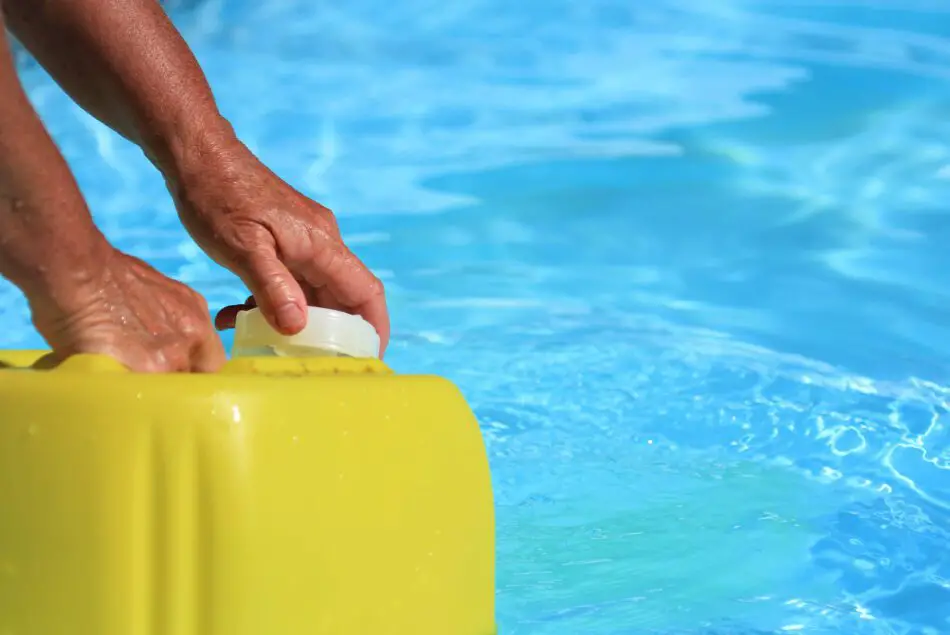
In this quick guide, we’ll answer the question “can you over shock a pool” and unveil the factors to consider when shocking a pool.
Best Pool Shock Quick Answers:
When you shock a swimming pool, you’re giving the water a powerful, concentrated dose of chlorine. The idea is to sterilize the water, ridding it of bacteria, chloramines, algae, and other contaminants. This generally eliminates cloudy water and makes your pool safe for swimming.
If you own a swimming pool, you’ll want to shock the water at the beginning of your swimming season (assuming you don’t use your pool year-round), as well as after heavy use. Other than that, we recommend shocking your pool either weekly or every other week, as part of your regular pool maintenance routine.
There’s a huge range of products on the market you can use to shock your pool – some of which are more effective and affordable than others. In this detailed guide, we’ll help you find the right type of shock for your swimming pool, so you can keep it clean, clear, and healthy for swimming.
If you’re like a lot of other pool owners, you’re probably wondering, Is there really a difference between these pool shock products? If so, which one should I buy? But the answer to that question will vary from person to person. The right shock for your pool depends on what type of pool you have, how many gallons of water you’re treating, and how often you plan to shock the water.

In this quick guide, we’ll answer the question “can you over shock a pool” and unveil the factors to consider when shocking a pool.
While simple bleach can, in principle, be used to shock a pool, most products that are specifically made for shocking pools contain higher amounts of sodium hypochlorite, which works as a disinfectant. Many also include either stabilized or unstabilized chlorine (without cyanuric acid), which works as a sanitizer.
Some pool shocks are better for treating algae and cloudy water, some are ideal for water purification, and others are more suitable for saltwater pools. Here’s a breakdown of the best pool shock products in each category.
If you’re looking for a tried-and-true, all-purpose pool shock, we recommend Aqua Chem Shock Xtra Blue. This product is suitable for use in all types of pools, including salt water pools, above-ground pools and inground pools. The active ingredient is sodium dichloro-s-triazinetrione (dichlor), which contains chlorine. It effectively kills algae, bacteria, and chloramines while making pool water crystal-clear and sparkling clean.
Best of all, Shock Xtra Blue works extremely fast – your pool will be swim-ready in as little as 15 minutes after treating it. Additionally, it’s formulated to reduce eye irritation and minimize the chlorine smell. This shock is also budget-friendly compared to similar products on the market.
SpaGuard Enhanced Spa Shock also stands out among the competition as a multi-purpose pool shock. It contains high amounts of chlorine (in the form of dichlor) to eliminate bacteria, residue, and other built-up contaminants in your pool, hot tub, or home spa. This pool shock also has a pH buffer, which helps you maintain water balance.
In addition to removing contaminants and balancing your water, it gets rid of unpleasant pool odors and helps restore clarity. It’s also one of the most affordable pool shocks you can buy.
As a pool owner, you may have heard about HTH, a leading supplier of swimming pool treatment products. But is HTH Pool Shock as good as you’ve heard? The brand’s Super Shock Treatment is considered to be the best pool shock for removing algae. It was developed to kill algae and unwanted bacteria in swimming pools by delivering the perfect chlorine boost.
This pool shock also leaves pool water crystal-clear within 24 hours. Plus, you won’t have to worry about the shock chemicals leaving a chlorine odor, causing eye irritation, or fading your vinyl liner. For best results, HTH Super Shock should be used to treat your pool water at least once a week.
Saltwater pools typically require less maintenance than standard chlorine pools, but they still need to be shocked regularly. If you have a saltwater pool, you may want to consider a shock that doesn’t contain liquid chlorine or come in the form of chlorine tablets. When it comes to shocking a saltwater pool, our pick is the Salt Essence Chlorine-Free Shock Oxidizer from CLOROX Pool&Spa.
It’s specially formulated to get rid of sweat, sunscreen, oils, bacteria, and other organic contaminants. Salt Essence can also correct cloudy water and eliminate odors. All in all, it’s an excellent swimming pool maintenance product that can be used as often as every week.
If you’re dealing with notably cloudy pool water, your best bet is CLOROX Pool&Spa Shock XtraBlue. This convenient, fast-dissolving liquid shock is exceptionally effective at cleaning and clearing swimming pools. It works by removing bacteria, chloramines, and other contaminants that cause murky water.
But that’s not all – Shock XtraBlue also inhibits the growth of various types of algae, including black algae, which tends to be the most stubborn. The powerful formula contains stabilizing cyanuric acid and works quickly without impacting your pH level, bleaching your pool liner, or affecting any other pool surfaces.
What’s the best pool shock for weekly treatment? We’re partial to Pool Essentials Shock Treatment, a fast-dissolving product that clears murky water by getting rid of oils, sweat, sunscreen, and other contaminants swimmers leave behind.
You can apply this easy-to-use chlorine shock directly to your pool water in the deepest area. Not only is it super effective at shocking pools, but it’s also affordable enough to use once a week (or even more if your swimming pool gets a lot of use). Pool Essentials Shock Treatment can be used at any time of year and is safe for frequent use.
Calcium hypochlorite is a solid, white material that can be used to shock pools. It’s typically sold in tablets or granular form and is known for effectively eliminating harmful germs in swimming pool water. The best calcium hypochlorite pool shock on the market is DryTec. This highly-rated granular shock product contains 68% of the active ingredient and comes in individual packs.
Each pack contains one pound of quick-dissolving swimming pool shock that sanitizes water in record time. In addition to killing bacteria, it prevents algae growth and destroys other organic contaminants. This pool shock can also help mitigate cloudiness and balance your water chemistry. Testing your water’s chemical ranges before and after using this product is recommended.
Before shocking your swimming pool, we highly recommend testing the water and finding the best pool vacuum to clean out any debris. A pool test strip will give you a read on your free chlorine, pH level, total alkalinity, cyanuric acid, borate, calcium hardness, and calcite saturation index. If you have a salt water pool, it can also tell you if your water is within the salinity (salt level) goal range.
If you test your water and see that your free chlorine level is below 3 ppm, shocking the pool is a good idea. We also suggest shocking your pool in the evening, because natural sunlight can break down as much as 5 ppm of chlorine each day. In addition to testing your water before treating it, we also recommend retesting afterward to make sure your chemical ranges are where they should be.
As stated above, shocking your swimming pool is an essential part of maintaining it. Even if the water appears clear, that doesn’t necessarily mean it’s chemically balanced. When a pool is used frequently, sunscreen, sweat, makeup, and lotion are deposited into the water, which can affect its balance. Whether swimmers leave behind contaminants or they crop up naturally, your pool water needs ongoing care to remain clean, balanced, and healthy.
Pool Calculator makes testing, treating, shocking, and balancing your swimming pool hassle-free and straightforward. First, you need to find the best pool test kit, then drop your chemical ranges into our handy app, and we’ll show you which products to add and how much of each is needed to stabilize the water. Get the Pool Calculator app for your desktop or on your Android or iOS mobile device to get started.
Sources:
https://www.thespruce.com/pool-cleaning-algae-colors-types-2736565
https://www.apsp.org/LinkClick.aspx?fileticket=VSlYKqTjp3A%3D&portalid=0
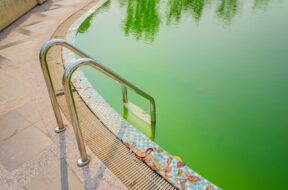
Want to learn more about algaecide? Read on to find out when to add algaecide to your pool maintenance routine and other helpful tips.
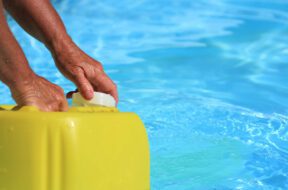
In this quick guide, we’ll answer the question “can you over shock a pool” and unveil the factors to consider when shocking a pool.
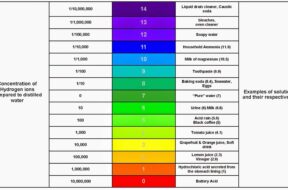
Maintaining both pH and total alkalinity in your swimming pool is important for keeping your pool properly sanitized and non-corrosive. Total alkalinity is to pH what cyanuric acid is to free chlorine. Total alkalinity stabilizes pH levels. The ideal pool pH level is 7.4 to 7.6. The ideal total alkalinity level is 80 to 120 ppm.
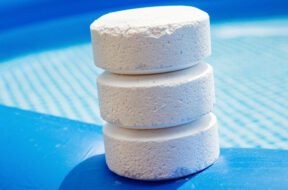
The Association of Pool and Spa Professionals recommends free chlorine levels for both swimming pools and hot tubs be kept between 2.0 and 4.0 ppm. However, the Center for Disease Control recommends free chlorine stay above 1 ppm in pools and 3 ppm in hot tubs.